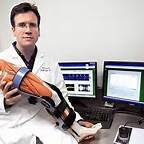
Biomedical Engineering Careers: What Do Biomedical Engineers Do?Through combining the fields of engineering, medicine and biology, biomedical engineers are able to develop concepts and procedures that would enable them to solve various medical and health related problems. Their job involves a lot of research that they would be doing with scientists, medical experts and chemists to develop and test items that would be used in the medical field. Some of these items would include artificial organs, prostheses, and instruments.
They also design and evaluate medical equipment such as MRIs, machines used in surgery, machines for blood testing, ultrasound and x-ray machines.Since the demand for low cost medicines are on the rise, this would give those who are in the field more opportunities, especially those who are involved with pharmaceuticals. Biomedical engineers who have finished their master’s degree are the most sought after in this field.
Biomedical Engineering Careers: Day To Day Tasks Of A Biomedical Engineer
Biomedical engineers are in constant research, they are always up to something new. With this, some of the things they would be doing everyday would be have to be done with many other people whether those would be other engineers, chemists, medical experts, and scientists. They work alongside each other for them to be able to develop products and medical systems.Since biomedical engineers bridge the gap between medicine and engineering, they are expected to have good technical knowledge as well as medical knowledge. Since this job primarily works with teams, excellent communication skills as well as leadership characters would also help greatly.
Biomedical Engineering Careers RequisitesA bachelor’s degree is the most basic requisite in order for one to be able to work as a biomedical engineer as most career openings in the field would require this as an entry level requirement. Just like how education is necessary, training is also very important. Some parts that would need training are in areas such as mechanical engineering, electronics engineering, and biomedical training. The skills that would be developed here are necessary in order for a biomedical engineer to be able to operate effectively on the field.Although it could be quite rare, some schools offer undergraduate courses in biomedical engineering. In addition to that, students can also add electives that would equip them with a lot of skills necessary.
Biomedical Engineering Careers Salary And Job Outlook
The average biomedical engineer earns about $80,000 in 2007. Some of the highest paid were those who are working with scientific research and development. They would earn around $92,780 per year. For those positions of which a lot of biomedical engineers desire to have, a master’s degree is required.
While there has only been 7,600 biomedical engineers in 2002, there are now around 14,000 biomedical engineers in the country, most of which are working with medical supplies and equipment while some of them in large employing organizations which would include pharmaceutical companies, scientific research services, and general and medical hospitals.While most engineering jobs are expected to grow slowly or even decline in the upcoming years, the demand for biomedical engineers is expected to grow. It is projected that there would be a 21% increase in jobs as 3,000 new jobs would be created until 2016. This is because the aging population would increase the demand for more effective equipment and medicines that are more effective.With that is the increase of demand for cost-effective medications that would also boost the demand for biomedical engineers.